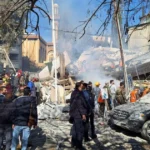Speaking in a strong statement at an investment conference in Riyadh, Saudi Foreign Minister Prince Faisal bin Farhan Al Saud Thursday condemned Israeli military actions in northern Gaza as “genocide,” emphasizing that recent violence reinforces Saudi Arabia’s stance against normalizing ties with Israel without a Palestinian state. He clarified that ongoing negotiations with the US on trade, artificial intelligence, and defense are not contingent on any normalization deal with Israel.
A Saudi minister of foreign affairs said the crisis is “genocide.”
Prince Faisal criticized the violence in Gaza, saying that the blockade by Israel and the continued military strikes were a form of genocide. He added that the actions taken by Israel had fully sealed off the area to humanitarian aid and safety for civilians, an act against international humanitarian laws. According to him, the ongoing war was a threat to continue the cycle of violence, thus further endangering peace in the region.
The Saudi government reaffirmed that it will not recognize Israel until a two-state solution is established. It said any steps toward normalization will only be taken “when the situation is amenable.”
U.S.-Saudi Agreements Not Dependent on Israel Normalization
Prince Faisal further said that future deals with the US on trade and artificial intelligence were proceeding without any correlation to steps toward normalization with Israel. “We are open to progress on these agreements, some of which may move forward quickly,” he said. Defense cooperation agreements can be complex and sometimes contingent on matters outside the kingdom’s control.
Saudi Arabia also considers security and nuclear agreements with the US as part of a broader normalization policy. Riyadh hoped to gain American defense security guarantees over the kingdom in case it normalized with Israel. Prince Faisal’s words, however, seem to indicate that his country would like to see movement on some of Washington’s agreements, even if they are not necessarily tied to Israel’s track.
As tensions remain high in the Middle East, gulf states, particularly Saudi Arabia, are putting in effort to try and de-escalate this conflict that seems to spiral out of control. The latest missile strikes between Israel and Iran have added a new dimension to the worry since both countries are in striking distance of Saudi Arabia. Riyadh has been making diplomatic efforts to improve relations with Iran and diplomatically acknowledged that problems are mainly caused by spillover effects from regional instability on diplomatic efforts.
Saudi Arabia, the largest oil exporter in the world and a major player in the region has been rather careful in managing its bilateral relations with Tehran and its strategic partnership with the US. In the unfolding situation in Gaza, Saudi moves reflect the cautions that the larger region cries vociferously for peace beyond political alliances.














